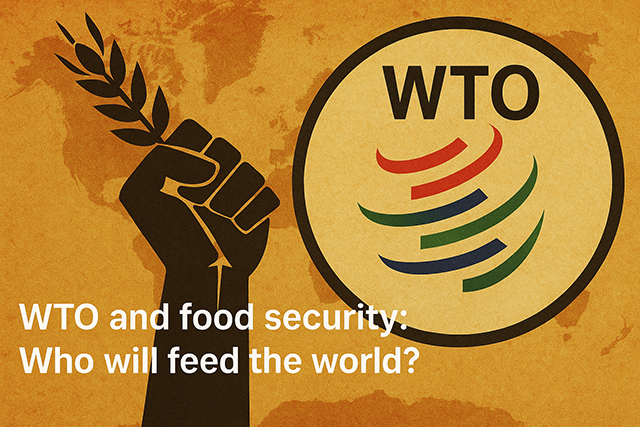
WTO and food security: Who will feed the world?


The WTO’s stalemate on agriculture and trade rules threatens global food security, leaving millions at risk of hunger
Amid the waning significance of the World Trade Organisation (WTO), the 13th Ministerial Conference (MC13), held in Abu Dhabi in early 2024, failed to inspire confidence in the multilateral trading system. Since then, escalating global trade tensions, sharpened by renewed U.S. protectionism under Donald Trump, have deepened the WTO’s credibility crisis.
With its dispute settlement mechanism paralysed and negotiations stalled, the organisation faces growing questions about its ability to deliver meaningful outcomes, particularly for least developed and net-food-importing economies. Member states could not progress on long-pending issues relating to food security, public stockholding (PSH), transparency in export restrictions, and market access during MC 13. Agricultural issues, once again, ended in deadlock, raising concerns for global food security and the fight against chronic hunger.

According to the Global Hunger Index (GHI) 2024, global progress against hunger has stalled. The GHI score fell only marginally from 18.8 in 2016 to 18.3 in 2024, with 42 countries still facing “serious” or “alarming” levels of hunger. The FAO estimates that 673 million people, or 8.2% of the world’s population, experienced hunger in 2024.
Behind these numbers lie deeper inequalities: 2.8 billion people cannot afford a nutritious diet, while 733 million lack even adequate calories, underscoring the daunting challenges of achieving the UN’s ‘Zero Hunger’ goal by 2030. Ongoing and prolonged conflicts in Gaza, Sudan, Syria, Eastern Europe, and various regions of Africa risk further exacerbating the crisis.
Tackling hunger is not only about food production. Trade conflicts, U.S. policy uncertainty, and the weakening of WTO rules continue to block equitable food access. Without a functional and credible multilateral system, the world’s poorest remain exposed to volatile prices, export bans, and subsidy distortions that undermine food security. For instance, under current WTO rules, India’s food procurement programmes risk breaching subsidy limits set at 10% of the value of production, calculated at outdated 1986–88 prices. For a country that procures over 60 million tonnes of rice and wheat annually for the Public Distribution System (PDS), this constraint is both unrealistic and inequitable.

Agriculture remains the WTO’s Achilles’ heel. While the 1995 Agreement on Agriculture (AoA) was designed to reduce trade-distorting subsidies, developed nations continue to provide enormous support to their farmers. The U.S. and EU together spend over $300 billion annually on agricultural support.
In contrast, India’s minimum support price (MSP) programmes and input subsidies, intended to ensure food security for hundreds of millions, are repeatedly challenged at the WTO as trade-distorting. The U.S.-Brazil cotton dispute exemplifies this: American subsidies depressed world cotton prices by 10–12.9%, costing African producers an estimated $147 million annually. The WTO eventually ruled against Washington, but years of distortion had already damaged livelihoods.
Beyond subsidies, developing countries face non-tariff measures (NTMs), technical standards, licensing requirements, and quotas that inflate trade costs. UNCTAD estimates NTMs impose twice the cost of tariffs on global trade. Such restrictions expose a deeper imbalance: developed nations demand unfettered access to developing markets while simultaneously raising invisible barriers under the guise of ‘safety’ and ‘quality standards’, impacting agricultural trade.

India’s approach at the WTO balances protecting farmers and expanding exports. India champions the Global South, advocating for fairer rules on agriculture, food security, and technology transfer, while also seeking access for its services, pharmaceuticals, and agri-products in developed markets. The challenge lies in reconciling these interests within a fragmented WTO.
The 14th WTO Ministerial Conference (MC14), scheduled in Yaoundé, Cameroon, in March 2026, is critical. Deliberations should focus on technology transfer to developing economies, particularly in food and agriculture, to foster market development and long-term sustainability. Disputes on agricultural subsidies, PSH, and export restrictions must be addressed to safeguard food security. Efforts to improve access, promote transparency, and encourage cooperation among members would mitigate prolonged food insecurity.
Additionally, member states must also commit to reducing and eventually eliminating export subsidies to prevent surplus dumping from developed to developing nations. Agricultural reforms must consider the urgent needs of developing and least developed food-importing countries emphasising a fair, market-orientated trading system.

MC14 will be an important platform for India, along with the G-33 nations and the African, Caribbean, and Pacific (ACP) Group, to push for a permanent solution on PSH, advocate dispute settlement reforms, address NTMs that disproportionately hurt their exporters, demand transparency, and push for reduced farm subsidies in developed countries. Pragmatic engagement with developed powers and coalition-building among developing nations is crucial to ensure global trade rules reflect both equity and sustainability, and to bridge the widening North-South divide.
The WTO is at a crossroads. While the majority of global trade is governed by WTO rules, failure to implement essential reforms risks further irrelevance. without adaptation, the multilateral order could fragment, leaving vulnerable economies and millions of hungry people exposed.
A multilateral, open, and predictable trading environment has historically increased purchasing power, created employment, and uplifted people from poverty. In the absence of a credible alternative, the founding principles of the WTO must not fade into a broken dream; they form the bedrock of a fair, rules-based global trading system. Their erosion would mark the beginning of unravelling.
No Techcircle journalist was involved in the creation/production of this content.


Chinmay Joshi and Nikita Gupta
Chinmay Joshi is a Research Associate in the Economics and Policy department, and Nikita Gupta is an Assistant Professor of Economics and Policy, both at S.P. Jain Institute of Management & Research (SPJIMR).
